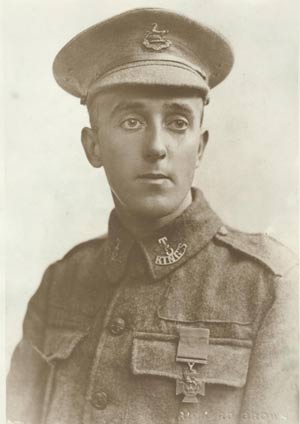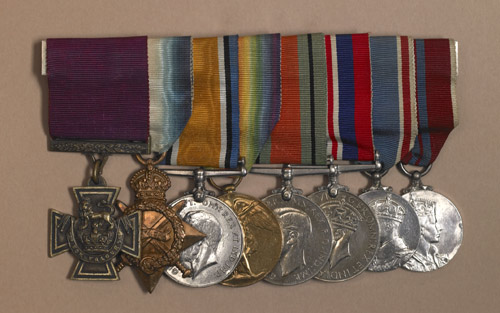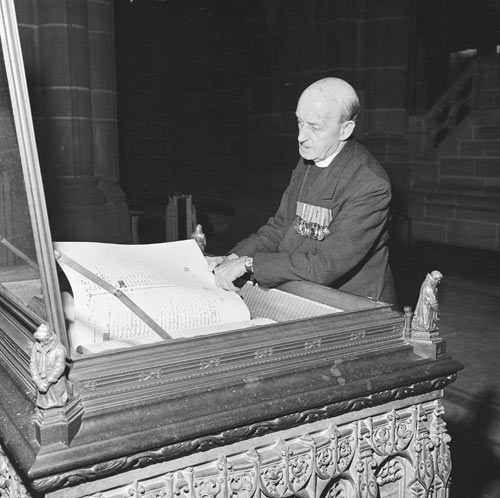
Arthur Herbert Procter
This morning there was a ceremony at the Freemason Hall in London, to unveil a memorial commemorating the 64 freemasons who were awarded the Victoria Cross during the First World War. One of the men featured was Arthur Herbert Procter, who served with the
King’s Liverpool Regiment.
Arthur was born in 1890 in Church Street, Bootle. His family moved to Lower Bebbington and for a short time Arthur lived with his uncle in Exeter, while attending school there. By 1911 he had returned to the North West, working as a clerk in the Provisions trade.
He was a member of the Stuart Road Mission and was also Secretary of the Independent Order of Good Templars in Birkenhead, a society which encouraged total abstinence from alcohol.
When war broke out in August 1914, Arthur initially joined the Voluntary Aid Detachment of the British Red Cross Society in Birkenhead, earning certificates in medical care. By November, he had enlisted in the 5th Battalion of the King’s Liverpool Regiment and the following February, arrived on the battlefields of France.
On 4 June 1916, the Battalion were at Ficheux, south of Arras. A trench raid in the early hours of the morning had gone disastrously wrong, when some of the artillery that was meant to cut the German barbed wire, had fallen short and landed amongst the raiding party. The remnants of the party returned to the British trenches, but were forced to leave the dead and wounded in no-mans-land.

Arthur’s medal group: Victoria Cross; 1914-15 Star; British War Medal (1914-20); Victory Medal (1914-19); Defence Medal (1939-45); War Medal (1939-45); King George VI Coronation Medal (1937); Queen Elizabeth II Coronation Medal (1953)
On hearing the groans of the wounded, Arthur requested that he be allowed to try and help them. For his actions, he was awarded the Victoria Cross (VC), the highest award given in Britain for bravery. His citation reads as follows:
For most conspicuous bravery. Private Procter, noticing some movement on the part of two wounded men, who were lying in the open in full view of the enemy at about 75 yards in front of our trenches, went out, on his own initiative, and, though heavily fired at, ran and crawled to the two men, got them under cover of a small bank, dressed their wounds, and after cheering them with the promise of rescue after dark, and leaving with them some of his clothing for warmth, regained our trenches again, being heavily fired at. At dusk both men were brought in alive.

Arthur standing on the steps of St George’s Hall. One of his Army pals is admiring his Victoria Cross.
He was presented with his VC on the battlefield by King George V, in the presence of Sir Douglas Haig and General Joffre. He was granted leave in August 1916, and on his return to Liverpool, he received a hero’s welcome. This extract is from an article in the 'Exeter and Plymouth Gazette':
He has been officially welcomed by the Lord Mayor of Liverpool at his battalion headquarters. Having been carried shoulder high from headquarters, he proceeded to the Liverpool Produce Exchange, where he was presented with a gold watch and a cheque for 100 guineas and £100 Four-and-a-half per cent War Loan.
Arthur was discharged in October 1918 after an illness and returned to his work in the Provisions trade. Later he took Holy Orders, and in 1927 was ordained. At the outbreak of the Second World War, he was Vicar of St Stephens in Hyde, Cheshire. In 1941 he joined up once again, this time as a Chaplain in the RAF.
He returned to civilian life in 1946 and spent time as Vicar at many parishes as far apart as Manchester and Devon. Arthur retired in 1965 and was living in Sheffield when he died in 1973.

Arthur turning the page of the Book of Remembrance in the Anglican Catherdral
Arthur’s medal group, including the VC is on display in the
From Waterfront to Western Front exhibition in the Museum of Liverpool.

 Arthur Herbert Procter
This morning there was a ceremony at the Freemason Hall in London, to unveil a memorial commemorating the 64 freemasons who were awarded the Victoria Cross during the First World War. One of the men featured was Arthur Herbert Procter, who served with the King’s Liverpool Regiment.
Arthur was born in 1890 in Church Street, Bootle. His family moved to Lower Bebbington and for a short time Arthur lived with his uncle in Exeter, while attending school there. By 1911 he had returned to the North West, working as a clerk in the Provisions trade.
He was a member of the Stuart Road Mission and was also Secretary of the Independent Order of Good Templars in Birkenhead, a society which encouraged total abstinence from alcohol.
When war broke out in August 1914, Arthur initially joined the Voluntary Aid Detachment of the British Red Cross Society in Birkenhead, earning certificates in medical care. By November, he had enlisted in the 5th Battalion of the King’s Liverpool Regiment and the following February, arrived on the battlefields of France.
On 4 June 1916, the Battalion were at Ficheux, south of Arras. A trench raid in the early hours of the morning had gone disastrously wrong, when some of the artillery that was meant to cut the German barbed wire, had fallen short and landed amongst the raiding party. The remnants of the party returned to the British trenches, but were forced to leave the dead and wounded in no-mans-land.
Arthur Herbert Procter
This morning there was a ceremony at the Freemason Hall in London, to unveil a memorial commemorating the 64 freemasons who were awarded the Victoria Cross during the First World War. One of the men featured was Arthur Herbert Procter, who served with the King’s Liverpool Regiment.
Arthur was born in 1890 in Church Street, Bootle. His family moved to Lower Bebbington and for a short time Arthur lived with his uncle in Exeter, while attending school there. By 1911 he had returned to the North West, working as a clerk in the Provisions trade.
He was a member of the Stuart Road Mission and was also Secretary of the Independent Order of Good Templars in Birkenhead, a society which encouraged total abstinence from alcohol.
When war broke out in August 1914, Arthur initially joined the Voluntary Aid Detachment of the British Red Cross Society in Birkenhead, earning certificates in medical care. By November, he had enlisted in the 5th Battalion of the King’s Liverpool Regiment and the following February, arrived on the battlefields of France.
On 4 June 1916, the Battalion were at Ficheux, south of Arras. A trench raid in the early hours of the morning had gone disastrously wrong, when some of the artillery that was meant to cut the German barbed wire, had fallen short and landed amongst the raiding party. The remnants of the party returned to the British trenches, but were forced to leave the dead and wounded in no-mans-land.
 Arthur’s medal group: Victoria Cross; 1914-15 Star; British War Medal (1914-20); Victory Medal (1914-19); Defence Medal (1939-45); War Medal (1939-45); King George VI Coronation Medal (1937); Queen Elizabeth II Coronation Medal (1953)
On hearing the groans of the wounded, Arthur requested that he be allowed to try and help them. For his actions, he was awarded the Victoria Cross (VC), the highest award given in Britain for bravery. His citation reads as follows:
Arthur’s medal group: Victoria Cross; 1914-15 Star; British War Medal (1914-20); Victory Medal (1914-19); Defence Medal (1939-45); War Medal (1939-45); King George VI Coronation Medal (1937); Queen Elizabeth II Coronation Medal (1953)
On hearing the groans of the wounded, Arthur requested that he be allowed to try and help them. For his actions, he was awarded the Victoria Cross (VC), the highest award given in Britain for bravery. His citation reads as follows:
 Arthur standing on the steps of St George’s Hall. One of his Army pals is admiring his Victoria Cross.
He was presented with his VC on the battlefield by King George V, in the presence of Sir Douglas Haig and General Joffre. He was granted leave in August 1916, and on his return to Liverpool, he received a hero’s welcome. This extract is from an article in the 'Exeter and Plymouth Gazette':
Arthur standing on the steps of St George’s Hall. One of his Army pals is admiring his Victoria Cross.
He was presented with his VC on the battlefield by King George V, in the presence of Sir Douglas Haig and General Joffre. He was granted leave in August 1916, and on his return to Liverpool, he received a hero’s welcome. This extract is from an article in the 'Exeter and Plymouth Gazette':
 Arthur turning the page of the Book of Remembrance in the Anglican Catherdral
Arthur’s medal group, including the VC is on display in the From Waterfront to Western Front exhibition in the Museum of Liverpool.
Arthur turning the page of the Book of Remembrance in the Anglican Catherdral
Arthur’s medal group, including the VC is on display in the From Waterfront to Western Front exhibition in the Museum of Liverpool.
